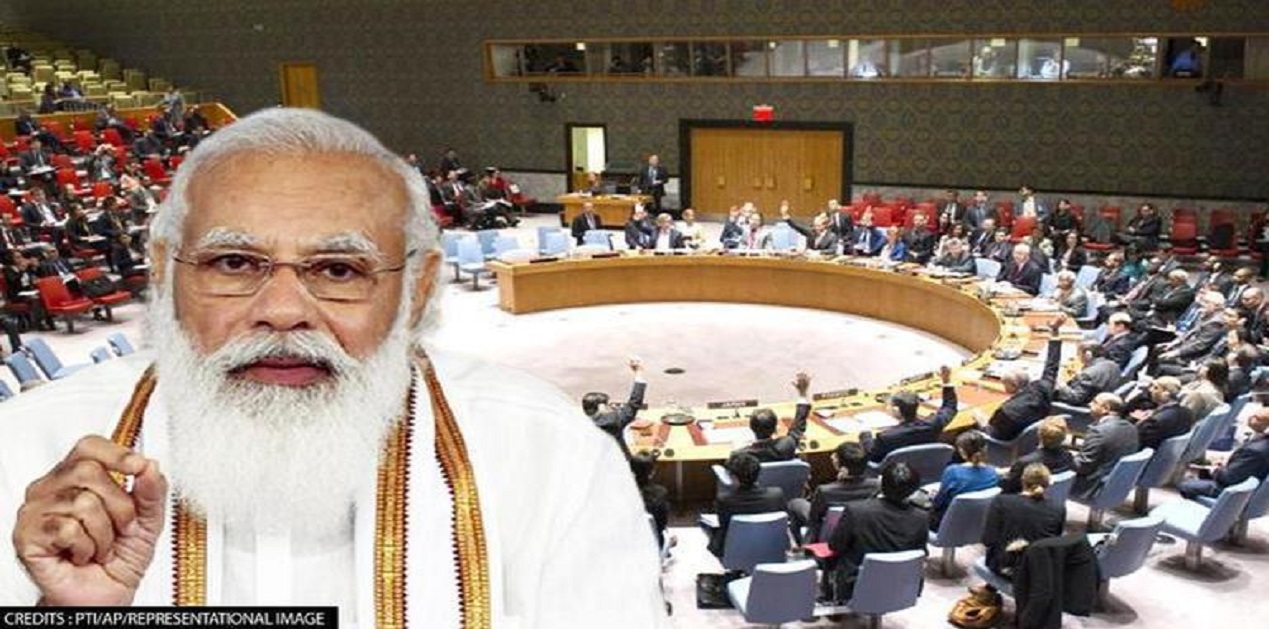On 9 August, Prime Minister Modi had the unique distinction of being the first Prime Minister of India to chair a session at the UN Security Council. It was carefully crafted to focus on the important issue of maritime security. It was debated at high levels during the Indian presidency of the Security Council.1
Maritime security dominates a lot of international engagement now, other than Afghanistan. The Indo-Pacific, East Asia Summit, Quad, South China Sea, the western Indian Ocean and the like are all gaining in importance because of the perception relating to maritime security.
It was thus an innovative diplomatic move for PM Modi to lay forth a five-point framework for maritime security in his speech at the UNSC.2 His emphatic points were incorporated in the Presidential statement on the issue.3
While this has attracted much attention, there is a quiet movement in parallel to establish the Colombo Security Conclave (CSC), between India, Sri Lanka and the Maldives. Originally established in 2011, its first meeting was in the Maldives, in 2013 in Sri Lanka, and in 2014 in India. Then it went into a hiatus due to the ambivalence in Colombo and in Male on relations with India in that period.
This forum was revived in November 2020 and held its first meeting at the level of National Security Advisors (NSA) and is named the CSC.4 It is to discuss specific proposals for cooperation. It was both a confidence building exercise among the three neighbours, as well as a capacity building engagement.
The Deputy NSAs met virtually on 4 August, for the fifth time. They discussed implementation of common objectives: ‘Current security measures, provisions, use of latest technology, bilateral cooperation and effectiveness and sustainability of such security measures among nations in the region, etc. have been discussed during the session’.5 In synchronisation with the PMs policy statement at the UNSC 5 days later, ‘the forum largely focussed on the security of regional maritime operations, prevention of smuggling of contraband, sea piracy, threat perceptions, close trilateral cooperation for further enhancement of security concerns, mitigation of illegal activities in the seas’.6
Importantly, this has now been expanded to include three observers, Bangladesh, Mauritius and Seychelles as members of the CSC.7 This gives it a wider regional context in the Western Indian Ocean. It will help to enhance the framework of maritime security cooperation.
The themes decided by this meeting of the CSC would deal with counterterrorism, extremism, transnational crimes, gun running, illegal trafficking of weapons and humans, protection of marine environment, HADR and the like. Cooperation will include building capacities in each of the partners to dealwith these issues. The possibility of joint exercises among them is bound to emerge sooner or later. All the CSC countries have an important relationshipwith India on maritime security and cooperation.
The CSC is a fulfilment of the ideas laidout by PM Modi at the UN Security Council meeting. The CSC covers Illegal, unreported and unregulated (IUU) fishing, not mentioned in the UNSC Statement though acknowledged as major maritime issue, The CSC does not mention UNCLOS since there are no maritime boundary issues within its members.
The CSC brings together three strands of India's cooperation in the region. It is consolidating cooperation between India, Sri Lanka and Maldives which has been notable since India put down the coup in the Maldives in 1988. At the time the IPKF was in Sri Lanka. With Bangladesh there is a separate and fulsome cooperation. This was enhanced when India settled its maritime boundary with Bangladesh on the basis of a ruling by the Permanent Court of Attribution (PCA) in 20148. PM Modi specifically mentioned this, in his speech to the UN as contrasted with the behaviour of China with several ASEAN countries in the South China Sea.
With Seychelles and Mauritius, India has a long tradition of maritime security cooperation. Their facilities and Coast Guard abilities are largely built by Indian assistance both through grants and in the case of Mauritius, also through credit lines. Indian personnel have often helped Mauritius and Seychelles to augment their capacities over many years. Thus, both men and material have contributed to building of capacity in bothSeychelles and Mauritius. This is slowly expanded into Madagascar and Comoros as well. The strategic importance of Mauritius and Seychelles as Indian Ocean countries saw them hived off the Eastern & Southern Africa division of the MEA and brought into the Indian Ocean division two years ago. Therefore, more and more, Mauritius, Seychelles, Maldives and Sri Lanka are viewed not only as strong bilateral engagements, but also as strategic engagements in the Indian Ocean.
This preceded the creation of the Indo-Pacific concepts currently invoked. Withthe Indo-Pacific concept, most countries are focused on the areas east of India, the South China Sea and the western Pacific. However, the CSC is actually looking at the Bay of Bengal, Arabian Sea and Western Indian Ocean in the main.9
Bangladesh and Sri Lanka are also part of BIMSTEC. All members of the CSC are members of the IORA. While there are overlapping domains with IORA and BIMSTEC, CSC is geographically defined and focused on maritime security cooperation. The CSC will have a Secretariat in Colombo.
The CSC is revived and expanded in the expectation that it would provide greater confidence building through regular meetings. Such CBMs may reduce the sharp edges which sometimes emerge when countries like Sri Lanka in particular or the Maldives earlier use their engagement with China to irritate India. So long as there is confidence that whatever any of our neighbours do with China, does not impact India's security or decrease a level playing field for it, there would perhaps be comfort with them. This could lead to mutual trust.
It is to be seen whether Sri Lanka will sooner or later attempt to bring China and Pakistan into the CSC equation. Sri Lanka is also slow to hold its share of meetings and needs to show commitment of a higher degree. With the Secretariat in Colombo, Sri Lanka can energise the CSC or hinder it too.
The CSC could achieve the functional cooperation required to build CBMs. What comes to mind immediately is the instances of fires on ships in the vicinity of Colombo, leading to pollution threats. Colombo was slow to seek Indian assistance A more cohesive and confident approach may have prevented the pollution arising out of such accidents.
There is also the issue which does not appear to have been discussed at the CSC but which PM Modi mentioned in his speech at the UN. This is regarding the seafaring community. India has about 240000 sea farers and is concerned with their welfare and safety. 10 Sri Lanka and Bangladesh with 10000 particularly have a concern. This issue could be of interest to CSC ahead.
Another important issue is control over drugs. The activity of the CSC could link the UN Office on Drugs and Crimes (UNODC) Indian Ocean East and Indian Ocean West’s workto deal with the UNODC Southern Route. This provides a coordinating platform for National Drug Enforcement Agencies. This is mentioned in the UNSC President’s Statement on Maritime Security Cooperation.
The Indian Ocean East office covers the Arabian Sea including India, Sri Lanka and Maldives while the West team located in Nairobi covers several African countries including Mauritius and Seychelles. Their programmes help capacity building of maritime law enforcement agencies and controls over the southern route partnership.
Drug enforcement agencies are now challenged as both Myanmar and Afghanistan are in civil turmoil which gives rise to larger drug running activity. Another area where the CSC could gain from an association with the southern route partnership is that the latter provides sharing of information through maritime domain awareness capacities it has installed. This will help to track dark vessels and their movement.
Thus, through the CSC, India and its neighbours in the Indian Ocean region have sought to build a regional framework of collaboration to deal with non-traditional threats in their vicinity. Such sub-regional arrangements are welcomed in paragraph 11 of the Presidents Statement. They can become a potent part of the evolving Indo-Pacific construct and be supportive of IORA and BIMSTEC as well.
Endnotes
- English translation of Prime Minister’s remarks at the UNSC High-Level Open Debate on “Enhancing Maritime Security: A Case For International Cooperation” (August 9, 2021) MEA, https://www.mea.gov.in/Speeches-Statements.htm?dtl/34152/Statement+by+the+President+of+the+Security+Council
- PM Modi outlines five-point framework for maritime security debate at UNSC
The Hindu, 9 August 2021, https://www.thehindu.com/news/national/prime-minister-narendra-modi-chairs-high-level-open-debate-at-united-nations-security-council/article35817763.ece - Statement by the President of the Security Council
9 August 2021, MEA, https://www.mea.gov.in/Speeches-Statements.htm?dtl/34152/Statement+by+the+President+of+the+Security+Council - 4th NSA Level Meeting on Trilateral Maritime Security Cooperation, November 26, 2020, MEA,https://mea.gov.in/press-releases.htm?dtl/33238/4th_NSA_Level_Meeting_on_Trilateral_Maritime_Security_Cooperation
- Colombo Security Conclave' further promotes region's maritime security, Ministry of Defence Sri Lanka, 5 August 2021,https://www.defence.lk/Article/view_article/3822
- ibid
- Colombo Security Conclave, 2021, Lankaxpress, 7 August 2021,https://www.lankaxpress.com/colombo-security-conclave-2021-focuses-on-furtherpromotion-of-maritime-security-and-total-security-in-theregion/
- Rupak Bhattacharjee, Delimitation of Indo-Bangladesh Maritime Boundary, IDSA, 19 August 2014,https://www.idsa.in/idsacomments/DelimitationofIndo-Bangladesh_rbhattacharjee_190814
- Gurjit Singh. The Indo-Pacific Concept and Its Africa Connect, Forbes Africa, 23 February 2021,https://www.forbesafrica.com/opinion/2021/02/23/the-indo-pacific-concept-and-its-africa-connect/
- Samanth Subramanian, Seafarers from Covid-hit India are struggling to get on ships, Quartz, 16 June 2021, https://qz.com/2020528/indias-seafarers-why-these-essential-workers-are-all-at-sea/
(The paper is the author’s individual scholastic articulation. The author certifies that the article/paper is original in content, unpublished and it has not been submitted for publication/web upload elsewhere, and that the facts and figures quoted are duly referenced, as needed, and are believed to be correct). (The paper does not necessarily represent the organisational stance... More >>
Image Source: https://img.republicworld.com/republic-prod/stories/promolarge/xhdpi/e2ltehbd2vagmppc_1628516345.jpeg










Post new comment